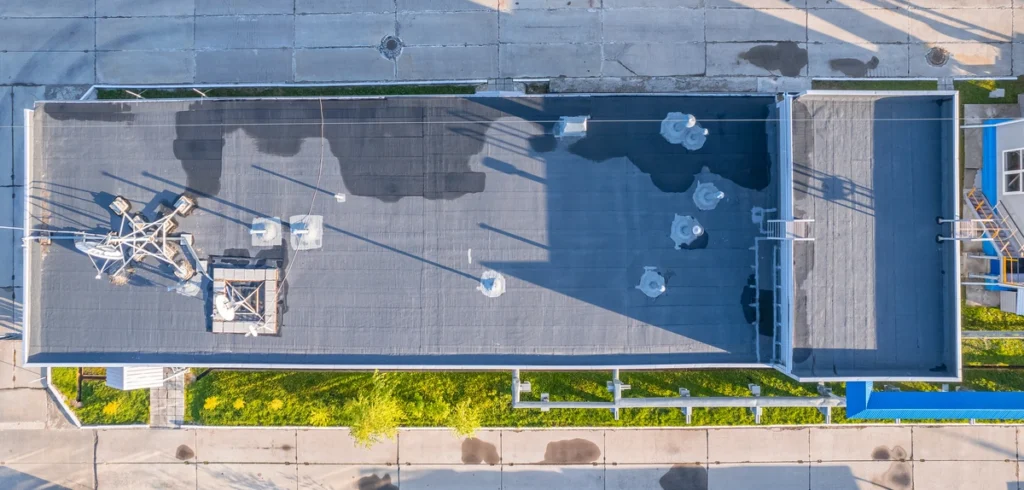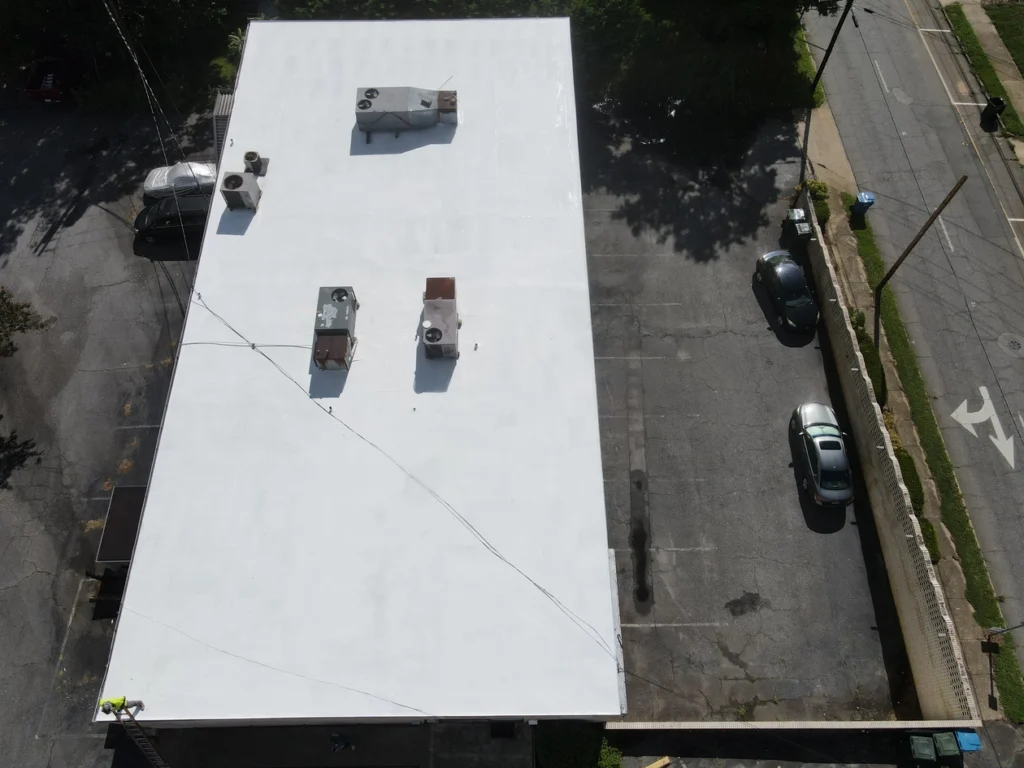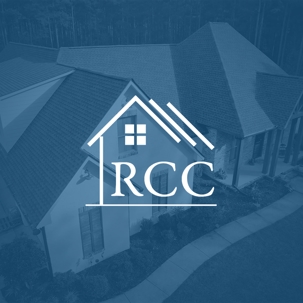Keeping the integrity of your commercial building’s roof in check is as important as maintaining any other part of your facility. A regular, thorough roof inspection can help you pinpoint potential problems before they become expensive repairs and extend the lifespan of your current roofing system.
In our blog post, we’ll walk you through what to expect when scheduling a commercial roof inspection – from assessing damage indicators like ponding water or cracks on to how many roofing layers to field to understanding how interior leaks might impact structural health.
Key Takeaways

- A commercial roof inspection is essential for extending the lifespan of your roof and identifying potential issues early on.
- During a commercial roof inspection, the condition and components of the roof will be thoroughly evaluated, including signs of wear and tear, structural defects, and improper drainage systems.
- The inspection will help identify current issues and potential problems that could arise in the future, allowing for prompt repairs or preventive action to prevent further damage.
- After the inspection, a professional roofing contractor will provide recommendations and next steps to address any identified issues, as well as a maintenance plan tailored specifically for your roof.
Purpose And Importance Of A Commercial Roof Inspection
A full commercial roof inspection plan serves an important purpose in extending the lifespan of the roof, identifying potential issues early, and ensuring compliance with regulations and warranties.
Extending The Lifespan Of The Roof
Regular inspections play a pivotal role in extending the lifespan of your commercial roof. This basic, yet vital maintenance routine aids in keeping your roofing system working optimally for as long as possible – often up to 40 years with diligent care.
During these inspections, professional roofing contractors examine every inch of your roof surface alongside its interior systems for signs of wear or damage that could escalate into more serious issues down the line if left unchecked.
Damage like rust or water stains on ceilings and interior walls are common indicators of potential problems occurring above them on the building’s rooftop.
Identifying Potential Issues Early
One of the key benefits of investing in a commercial and roof inspection program is being able to identify potential issues at an early stage.
Consider, for example, signs of rust or water stains often found during detailed roof inspections. These are typically indications of a hidden roof leak that could expand over time if left unchecked, causing extensive harm to both the roofing system and the building’s interior structure.
Likewise, examining a building’s records as part of an initial roof survey enables seasoned inspectors to predict what kind of problem areas they might encounter on the commercial roof.
Consequently, through regular inspections conducted by reliable commercial roof contractors equipped with such insights, potential issues can be discovered ahead of time.
Ensuring Compliance With Regulations And Warranties
Ensuring that your commercial roof is compliant with relevant regulations and warranties plays a significant role in maintaining its health. Not only does this chip away at potential legal issues, but it also demonstrates your commitment as a building owner to keep the structure of your property in top-notch condition.
For instance, adherence to standards set by bodies like the National Roofing Contractors Association (NRCA) or Occupational Safety and Health Administration (OSHA) forms an integral part of these inspections.
Staying within warranty guidelines ensures you aren’t accidentally voiding any agreements either. In fact, many warranties command routine commercial roof inspections to be upheld – neglecting these could result in expensive repairs down the line not being covered.
Therefore, having a comprehensive plan for scheduled checks and using standardized checklists for conducting these thorough evaluations becomes pivotal to proper facilities management.
What To Expect During A Commercial Roof Inspection

During a commercial roof inspection, a professional roofing contractor will thoroughly inspect and evaluate the condition and components of the roof to identify any current or potential issues.
Evaluation Of The Roof’s Condition And Components
During a commercial roof inspection, one crucial aspect is evaluating the condition and components of the roof. This involves closely examining the roof surfaces of various elements to identify any signs of damage, wear and tear, or potential issues that may affect the roof’s performance.
Additionally, they’ll assess the structural integrity of the roof deck and building by checking for any signs of movement or structural defects that might compromise the roof’s stability.
The evaluation also includes examining flashings, edges, joint connections, drainage systems, and any penetrations such as vents or satellite dishes.
By thoroughly assessing every component of your commercial roofing system during an inspection process like this one , you’ll be equipped with a comprehensive understanding of its overall health — including insight into specific areas needing repairs or preventive maintenance actions — helping you make informed decisions about how best to care for your valuable investment in between inspections down through time
Identification Of Current And Potential Issues
During a commercial roof inspection, one of the key objectives of detailed roof inspection is to identify any current issues and potential problems that could arise in the future. A thorough assessment is conducted by a professional roofing contractor, who will carefully examine the roof’s condition and components.
This includes checking for signs of wear and tear, such as ponding or standing water, flow patterns, holes, leaks, and other indicators of serious damage. For example, if there are areas where water tends to accumulate or flow improperly due to improper drainage systems or blocked gutters, these issues can be identified during the inspection.
Additionally, the inspector will look for any structural defects or movements of debris that may affect the integrity of the roof. This could include cracks in shingles or seams, rusted metal surfaces on flat roofs, or damaged flashing around penetrations like chimneys or HVAC units.
By identifying these current issues and potential problems early on through a detailed commercial roof inspection process, building owners can take preventive action before further damage occurs.
Recommendations And Next Steps
After conducting a thorough commercial roof inspection, the roofing contractor will provide you with valuable recommendations and next steps to address any identified issues.
These recommendations may include immediate repairs or maintenance tasks that are necessary to prevent further damage and extend the lifespan of your roof.
In addition to addressing current problems, the contractor may also recommend a maintenance plan tailored specifically for your roof. This plan will outline routine inspections and preventive actions required to keep your roof in optimal condition throughout its lifespan.
It’s important to note that hiring a professional roofing contractor is crucial for both inspections and repairs. They have expertise in identifying hidden issues and recommending appropriate courses of action based on their findings.
By following these recommendations and taking proactive steps towards maintaining your commercial roof, you can not only protect your building investment but also ensure a safe and comfortable environment for occupants inside.
Taking Action Based On The Inspection

After the commercial roof inspection is complete, the building owner should promptly address any identified issues and repairs to any roof leaks prevent further damage.
Addressing Identified Issues And Repairs
Promptly addressing identified issues and repairs is a critical step in maintaining the integrity of your commercial or roof’s interior system. Ignoring or delaying repairs can lead to further damage, costly repairs, and disruptions to your business operations.
Addressing issues may involve repairing leaks, patching cracks, replacing damaged shingles or membranes, or fixing structural defects.
Additionally, following through on recommended repairs helps ensure that your commercial roof performs optimally during inclement weather conditions such as heavy rain or snow.
To ensure proper repair work is done efficiently and effectively, it’s advisable to hire a professional roofing contractor who has experience in commercial roofing systems.
Remember that regular inspections combined with timely repairs are key components of a comprehensive preventive maintenance plan for your commercial roof.
Developing A Maintenance Plan To Prevent Future Problems
Developing a comprehensive maintenance plan is crucial when it comes to protecting your commercial roof and preventing future issues. By implementing a proactive approach, you can identify potential roof problems that occur early on and take preventive action before they become costly repairs.
Additionally, it’s essential to keep detailed records of all inspections, repairs, and warranties for proper documentation. This information will help you track the condition of your roof over time and ensure that all necessary maintenance tasks are being addressed.
Working with a professional roofing contractor who specializes in commercial roofs is highly recommended for developing an effective maintenance plan.
Remember that every commercial building has different requirements based on factors such as location, weather conditions, age of the building, among others.
Importance Of Hiring A Professional Roofing Contractor For Inspections And Repairs
Hiring a professional roofing contractor for inspections and repairs is of utmost importance when it comes to maintaining the integrity and longevity of your commercial roof.
By entrusting a professional roofing contractor with your inspection and repair needs, you can rest assured that they will conduct a thorough evaluation of your roof’s components, such as the roof surface, decking, roof perimeter, penetrations, drainage systems, and more.
Moreover, professional contractors provide you with a detailed inspection report that outlines their findings along with recommended repairs or actions.
Not only do professional contractors possess technical expertise but they also have access to specialized equipment necessary for comprehensive inspections.
Additionally, hiring professionals ensures that repairs are done right the first time around.
In conclusion, enlisting the services of a reliable commercial roofing contractor offers numerous benefits including accurate assessments of your roof’s condition and timely repairs conducted by experienced professionals.
Conclusion
In conclusion, getting a commercial roof inspection is crucial for the long-term health and lifespan of your roof. By identifying potential issues early on, you can prevent expensive repairs and ensure reliable commercial roof contractor incompliance with regulations and warranties.
During the inspection, you can expect a thorough evaluation of your roof’s condition and components, as well as recommendations for necessary repairs or maintenance. It’s important to hire a professional roofing contractor who has expertise in commercial roofs to conduct these inspections.
By taking action based on the inspection findings, addressing identified issues promptly, and implementing a proactive maintenance plan, you can prevent future problems and protect your investment in your commercial building. If you’d rather have a professional do it, contact Rankin County Custom.

